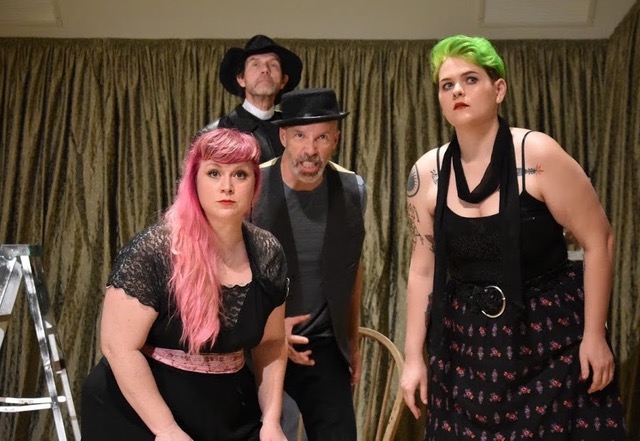Opera In Concert’s double bill explores the Nazi era, from Weill to Blacher

Stephanie Smittle, John Kuether, Doug Brunker, and Rachel Catlett in Opera in Concert’s performance of Kurt Weill’s “Mahagonny-Songspiel” Friday night at the Sammons Arts Center in Dallas.
Titled “A Night in Berlin,” Friday night’s performance by the Dallas-based Opera in Concert might just as well have been called “Opera on the Edge of the Inferno.”
For, in a superb stroke of program-building, the evening presented one work written in Berlin in 1927, just as Germany was beginning its quick and slide into Naziism, paired with another written in Berlin in 1946, with Germany just a few months past the final moments of that disastrous era.
The performance took place in the Sammons Arts Center, a historic converted pump station, which serves as a rehearsal and performance facility for various small arts organizations, The opening work of the evening, Kurt Weill’s Mahagonny-Songspiel, with text by Bertolt Brecht, was composed as a sort of preliminary study for Weill’s epic Rise and Fall of the City of Mahagonny (completed three years later).
The work attacks 20th-century decadence, sensuality, and materialism by whole-heartedly diving into that decadence, with a relentlessly busy, pungently dissonant, and adamantly anti-lyrical score. Set in the imaginary city of Mahagonny, a degraded version of America as imagined by early-20th-century Europeans, Mahagonny-Songspiel lingers for half an hour over lust for money, whiskey, and sex as presented by a sextet of two female and four male singers.
For this semi-staged version, a jumble of ladders, benches, and warehouse pallets served as sets; Stephen Dubberly, music director of the University of North Texas Opera, accompanied and directed from the piano with lively precision. The acoustic of the cavernous fourth-floor room played havoc with balance and audibility at times; the two female singers, Stephanie Smittle and Rachel Catlett, seemed torn between a straight-toned pop style and operatic, full-vibrato performance, though they communicated a jaded degradation convincingly. Tenor Steven Brennfleck as Charlie delivered his role with outstanding presence and a clear, lyric voice in an outstanding performance.
Edward Crafts, internationally renowned bass-baritone and the guiding artistic force behind Opera in Concert, served as stage director for this production, which in spite of flaws, generally provided a rare and worthwhile live performance of this epoch-shattering operatic work. Crafts also translated the German portions of the text, which was partly in English in the original version.
While Weill fled to the United States with the rise of Naziism, Boris Blacher remained in Germany, drawing official condemnation from Hitler’s regime for the decadence of his art but managing to survive Hitler and World War II. Shortly after the war, he produced the radio opera The Tide, a parable of four people (a fisherman, a banker, a young man, and the banker’s young mistress) trapped on a shipwreck as a rising tide threatens to drown them. Here, the pallets and ladders were arranged to suggest a ship in this physically and emotionally perilous setting.
For this portion of the evening, singing and acting were flawless and captivating; Crafts took the role of the Banker, playing up the aspect of physical deterioration coupled with the character’s addiction to money, while applying his famously rich vocal powers.
Soprano Gabrielle Gilliam sang and acted the role of the Young Woman with a beautifully resonant vocal quality. Tenor Brennfleck returned as the Young Man whose lust and desperation drives him to murder, while baritone Joshua Hughes brought an equally powerful lyricism and ardor as The Fisherman who falls in love with the Banker’s mistress.
Dubberly once again ably accompanied and directed from the piano. The Tide is a bit less acerbic musically than Mahagonny Songspiel, and a bit more obvious in its drama, but it emerged in this performance as an intriguingly powerful statement from a composer at a painful and pivotal moment in history.